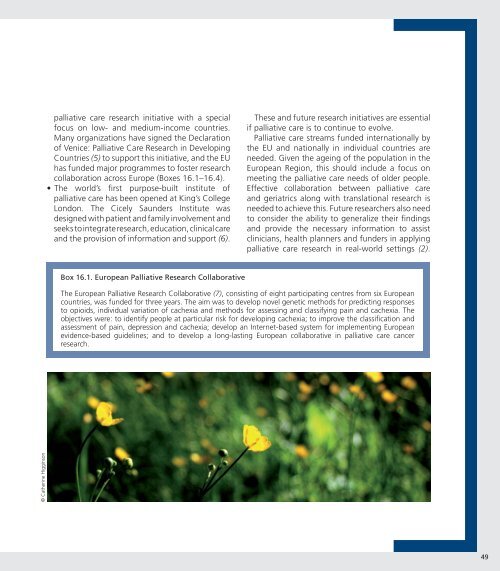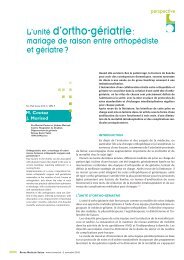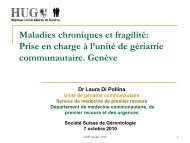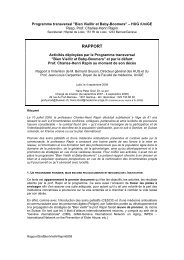Palliative care for older people - World Health Organization ...
Palliative care for older people - World Health Organization ...
Palliative care for older people - World Health Organization ...
You also want an ePaper? Increase the reach of your titles
YUMPU automatically turns print PDFs into web optimized ePapers that Google loves.
palliative <strong>care</strong> research initiative with a specialfocus on low- and medium-income countries.Many organizations have signed the Declarationof Venice: <strong>Palliative</strong> Care Research in DevelopingCountries (5) to support this initiative, and the EUhas funded major programmes to foster researchcollaboration across Europe (Boxes 16.1–16.4).• The world’s first purpose-built institute ofpalliative <strong>care</strong> has been opened at King’s CollegeLondon. The Cicely Saunders Institute wasdesigned with patient and family involvement andseeks to integrate research, education, clinical <strong>care</strong>and the provision of in<strong>for</strong>mation and support (6).These and future research initiatives are essentialif palliative <strong>care</strong> is to continue to evolve.<strong>Palliative</strong> <strong>care</strong> streams funded internationally bythe EU and nationally in individual countries areneeded. Given the ageing of the population in theEuropean Region, this should include a focus onmeeting the palliative <strong>care</strong> needs of <strong>older</strong> <strong>people</strong>.Effective collaboration between palliative <strong>care</strong>and geriatrics along with translational research isneeded to achieve this. Future researchers also needto consider the ability to generalize their findingsand provide the necessary in<strong>for</strong>mation to assistclinicians, health planners and funders in applyingpalliative <strong>care</strong> research in real-world settings (2).Box 16.1. European <strong>Palliative</strong> Research CollaborativeThe European <strong>Palliative</strong> Research Collaborative (7), consisting of eight participating centres from six Europeancountries, was funded <strong>for</strong> three years. The aim was to develop novel genetic methods <strong>for</strong> predicting responsesto opioids, individual variation of cachexia and methods <strong>for</strong> assessing and classifying pain and cachexia. Theobjectives were: to identify <strong>people</strong> at particular risk <strong>for</strong> developing cachexia; to improve the classification andassessment of pain, depression and cachexia; develop an Internet-based system <strong>for</strong> implementing Europeanevidence-based guidelines; and to develop a long-lasting European collaborative in palliative <strong>care</strong> cancerresearch.© Catherine Higginson49
















